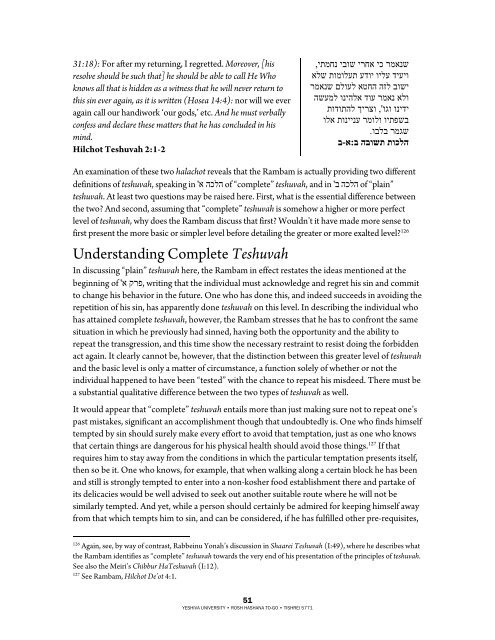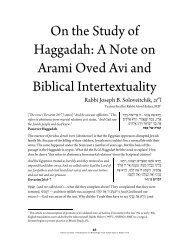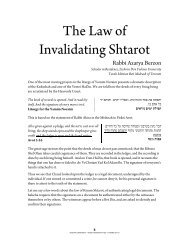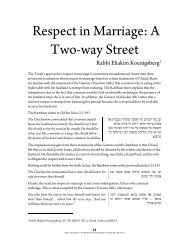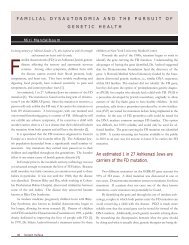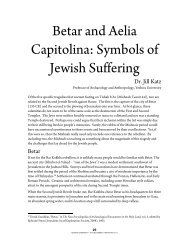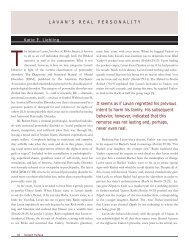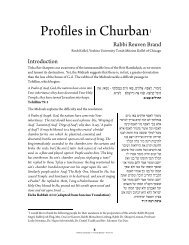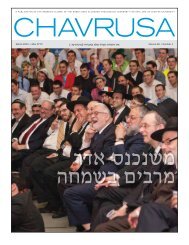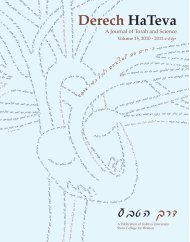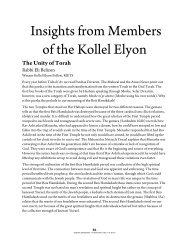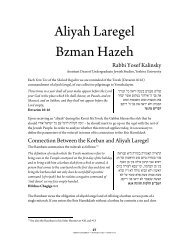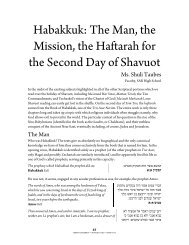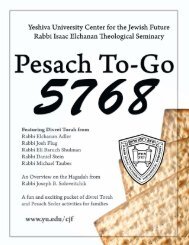YESHIVA UNIVERSITY • ROSH HASHANA TO-GO ... - YUTorah.org
YESHIVA UNIVERSITY • ROSH HASHANA TO-GO ... - YUTorah.org
YESHIVA UNIVERSITY • ROSH HASHANA TO-GO ... - YUTorah.org
Create successful ePaper yourself
Turn your PDF publications into a flip-book with our unique Google optimized e-Paper software.
31:18): For after my returning, I regretted. Moreover, [his<br />
resolve should be such that] he should be able to call He Who<br />
knows all that is hidden as a witness that he will never return to<br />
this sin ever again, as it is written (Hosea 14:4): nor will we ever<br />
again call our handiwork ‘our gods,’ etc. And he must verbally<br />
confess and declare these matters that he has concluded in his<br />
mind.<br />
Hilchot Teshuvah 2:1-2<br />
51<br />
<strong>YESHIVA</strong> <strong>UNIVERSITY</strong> <strong>•</strong> <strong>ROSH</strong> <strong>HASHANA</strong> <strong>TO</strong>-<strong>GO</strong> <strong>•</strong> TISHREI 5771<br />
, יתמחנ יבוש ירחא יכ רמאנש<br />
אלש תומולעת עדוי וילע דיעיו<br />
רמאנש םלועל אטחה הזל בושי<br />
השעמל וניהלא דוע רמאנ אלו<br />
תודותהל ךירצו ,'וגו<br />
ונידי<br />
ולא תוניינע רמולו ויתפשב<br />
. ובלב רמגש<br />
ב-א:<br />
ב הבושת תוכלה<br />
An examination of these two halachot reveals that the Rambam is actually providing two different<br />
definitions of teshuvah, speaking in ' א הכלה of “complete” teshuvah, and in ' ב הכלה of “plain”<br />
teshuvah. At least two questions may be raised here. First, what is the essential difference between<br />
the two? And second, assuming that “complete” teshuvah is somehow a higher or more perfect<br />
level of teshuvah, why does the Rambam discuss that first? Wouldn’t it have made more sense to<br />
first present the more basic or simpler level before detailing the greater or more exalted level? 126<br />
Understanding Complete Teshuvah<br />
In discussing “plain” teshuvah here, the Rambam in effect restates the ideas mentioned at the<br />
beginning of ' א קרפ,<br />
writing that the individual must acknowledge and regret his sin and commit<br />
to change his behavior in the future. One who has done this, and indeed succeeds in avoiding the<br />
repetition of his sin, has apparently done teshuvah on this level. In describing the individual who<br />
has attained complete teshuvah, however, the Rambam stresses that he has to confront the same<br />
situation in which he previously had sinned, having both the opportunity and the ability to<br />
repeat the transgression, and this time show the necessary restraint to resist doing the forbidden<br />
act again. It clearly cannot be, however, that the distinction between this greater level of teshuvah<br />
and the basic level is only a matter of circumstance, a function solely of whether or not the<br />
individual happened to have been “tested” with the chance to repeat his misdeed. There must be<br />
a substantial qualitative difference between the two types of teshuvah as well.<br />
It would appear that “complete” teshuvah entails more than just making sure not to repeat one’s<br />
past mistakes, significant an accomplishment though that undoubtedly is. One who finds himself<br />
tempted by sin should surely make every effort to avoid that temptation, just as one who knows<br />
that certain things are dangerous for his physical health should avoid those things. 127 If that<br />
requires him to stay away from the conditions in which the particular temptation presents itself,<br />
then so be it. One who knows, for example, that when walking along a certain block he has been<br />
and still is strongly tempted to enter into a non-kosher food establishment there and partake of<br />
its delicacies would be well advised to seek out another suitable route where he will not be<br />
similarly tempted. And yet, while a person should certainly be admired for keeping himself away<br />
from that which tempts him to sin, and can be considered, if he has fulfilled other pre-requisites,<br />
126 Again, see, by way of contrast, Rabbeinu Yonah’s discussion in Shaarei Teshuvah (I:49), where he describes what<br />
the Rambam identifies as “complete” teshuvah towards the very end of his presentation of the principles of teshuvah.<br />
See also the Meiri’s Chibbur HaTeshuvah (I:12).<br />
127 See Rambam, Hilchot De’ot 4:1.


